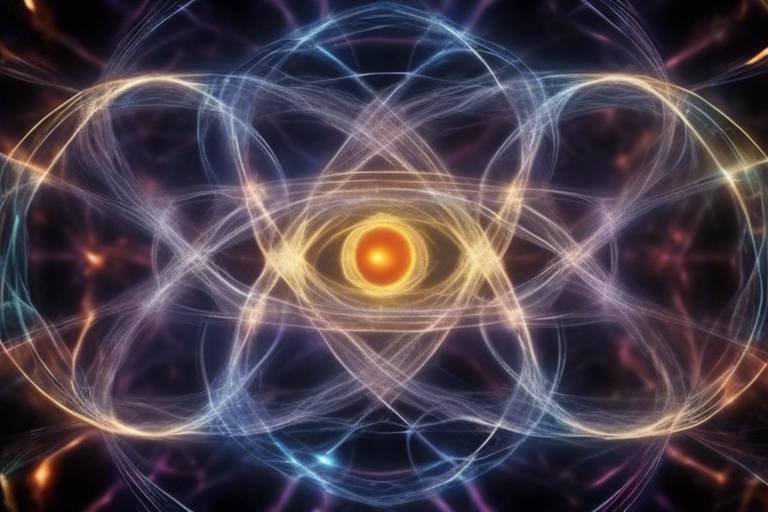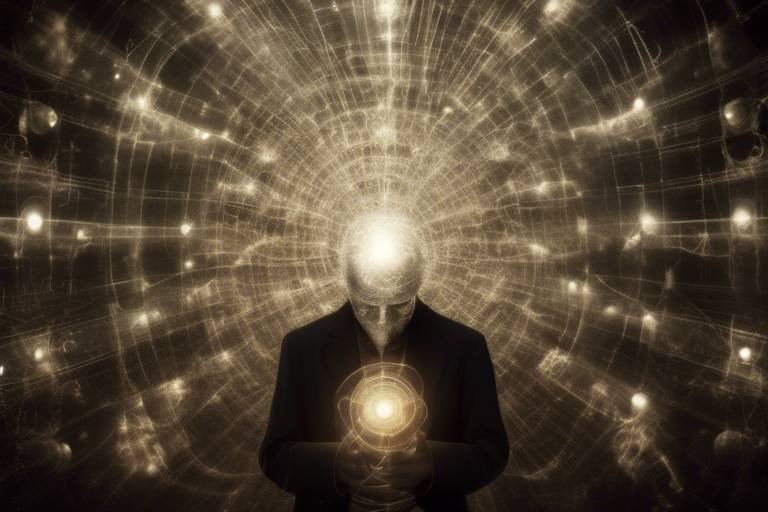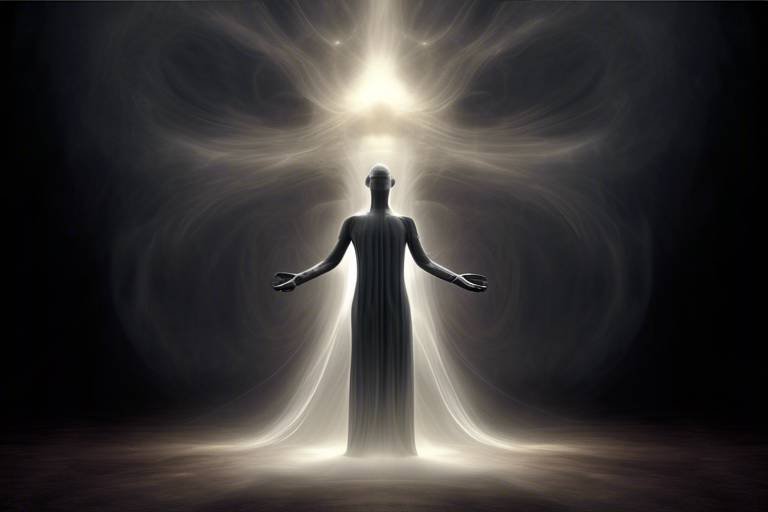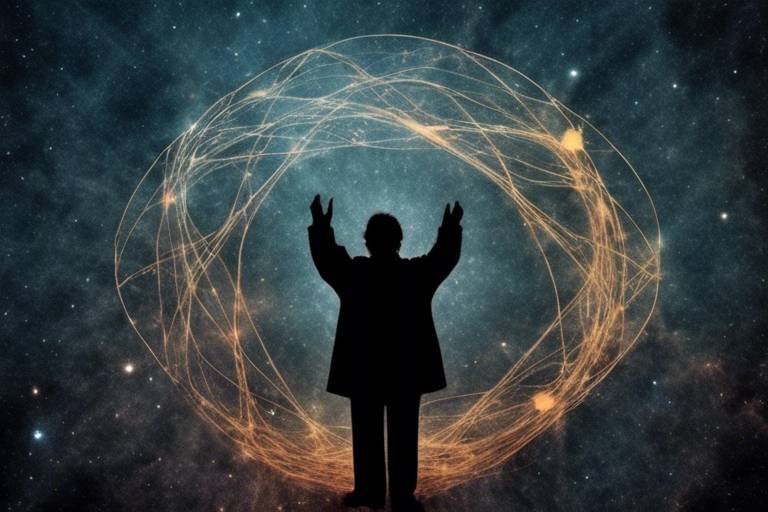How does Metaphysics Relate to Quantum Physics?
Have you ever wondered how the abstract concepts of metaphysics intertwine with the perplexing principles of quantum physics? It's a fascinating dance between the philosophical and the scientific, where the rules of reality seem to bend and twist in ways that challenge our conventional understanding. At its core, metaphysics delves into the fundamental nature of reality, existence, and the universe, while quantum physics explores the behavior of matter and energy at the smallest scales. This relationship raises profound questions about the nature of existence, observation, and the very fabric of reality.
As we delve deeper, we find that quantum physics is not just a collection of equations and theories; it provokes philosophical inquiry into what it means to exist and how our perceptions shape that existence. For instance, when we consider the implications of quantum phenomena, such as particles existing in multiple states simultaneously, we are compelled to ask: What does this mean for our understanding of reality? Are we merely observers in a universe that exists independently, or does our observation play a crucial role in shaping that reality?
In essence, the relationship between metaphysics and quantum physics is like a tapestry woven with threads of inquiry, each strand representing a different perspective on existence, observation, and the universe. The philosophical implications of quantum mechanics challenge our understanding of determinism and free will, urging us to reconsider the very nature of existence. Are we masters of our fate, or are we bound by the deterministic laws of physics? The exploration of these questions not only enriches our scientific understanding but also deepens our philosophical insights.
As we navigate this complex terrain, it's essential to consider how these concepts resonate with our daily lives. Just as a ripple in a pond can affect the entire surface, the interactions at the quantum level may have far-reaching implications for our understanding of the universe. In this article, we will explore various aspects of this relationship, from the observer effect to the philosophical interpretations of quantum theory, illuminating the intricate connections that bind metaphysics and quantum physics together.
Quantum physics challenges classical notions of reality, prompting philosophical inquiry into the nature of existence, observation, and the role of the observer, which metaphysics seeks to address.
The observer effect in quantum mechanics raises questions about the role of consciousness in shaping reality, a topic deeply explored in metaphysical discussions regarding the nature of perception and existence.
Measurement in quantum physics leads to philosophical debates about determinism and free will, as the act of measuring influences outcomes, echoing metaphysical inquiries into causality and existence.
The tension between determinism in physics and the notion of free will in metaphysics invites exploration of whether human consciousness can influence quantum events or if everything is predetermined.
The implications of measurement in quantum physics challenge our understanding of reality, prompting metaphysical discussions on the nature of existence and the universe's fundamental structure.
Quantum entanglement introduces the concept of non-locality, suggesting a deeper interconnection in the universe that resonates with metaphysical ideas of unity and the interconnectedness of all things.
Different interpretations of quantum mechanics, such as the Copenhagen and many-worlds interpretations, reflect various metaphysical perspectives on reality, existence, and the nature of the universe.
The debate between realism and anti-realism in quantum physics highlights fundamental metaphysical questions about the nature of reality, existence, and the implications of scientific theories on our understanding of the universe.
Theories and models in quantum physics serve as metaphysical frameworks that shape our understanding of reality, reflecting how scientific inquiry and philosophical thought can inform one another.
- What is the observer effect in quantum physics? The observer effect refers to changes that the act of observation can make on a phenomenon being observed, particularly in quantum mechanics.
- How does metaphysics influence scientific interpretations? Metaphysics provides a philosophical foundation that can shape how we interpret scientific findings and the nature of reality.
- Can consciousness affect quantum events? This is a debated topic; some interpretations suggest that consciousness may play a role in shaping reality, while others argue for a deterministic view.

The Philosophical Foundations of Quantum Physics
Quantum physics is not just a set of equations describing the behavior of particles at the subatomic level; it is a revolutionary framework that challenges our fundamental understanding of reality. At its core, quantum mechanics invites us to reconsider the very nature of existence, observation, and the role of the observer. This is where metaphysics, the philosophical study of the nature of reality, comes into play. It poses profound questions: What is real? How do we know what we know? And most intriguingly, does our consciousness have the power to shape the universe we inhabit?
In classical physics, reality is often perceived as a concrete entity, governed by deterministic laws where every action has a predictable reaction. However, quantum physics introduces a level of uncertainty and complexity that defies these classical notions. For instance, particles can exist in multiple states at once, a phenomenon known as superposition. This challenges the very idea of a singular, objective reality. Philosophers have long debated the implications of such findings, pondering whether reality is an objective entity waiting to be discovered or a subjective experience shaped by our perception.
The relationship between the observer and the observed is another critical aspect that quantum physics brings to the forefront. The act of observation itself seems to affect the outcome of experiments, leading to what is known as the observer effect. This phenomenon raises questions about the nature of consciousness and its role in shaping reality. Are we mere spectators in a grand cosmic play, or do we actively participate in the unfolding of events? Metaphysics seeks to explore these questions, delving into the intricacies of perception, existence, and the interconnectedness of all things.
Moreover, the philosophical implications of quantum mechanics extend to concepts like causality and free will. When we measure a quantum system, we influence its state, which echoes metaphysical inquiries into the nature of causation. Are we, as conscious beings, capable of influencing the quantum realm, or are we bound by a predetermined universe where every event is set in motion by prior causes? This tension between determinism and free will is a rich field of exploration in both physics and philosophy, inviting us to reconsider our place in the universe.
In summary, the philosophical foundations of quantum physics challenge us to rethink our understanding of reality. They invite a dialogue between science and philosophy, urging us to explore the deeper implications of quantum phenomena. As we delve into the mysteries of the quantum world, we find ourselves at the intersection of science and metaphysics, where the nature of existence, observation, and consciousness converge.
- What is the observer effect in quantum physics? The observer effect refers to changes that the act of observation can make on a quantum system, suggesting that the mere act of measuring can influence the outcome of an experiment.
- How does quantum physics challenge classical physics? Quantum physics introduces concepts like superposition and entanglement, which defy classical notions of determinism and objective reality.
- What role does consciousness play in quantum mechanics? The relationship between consciousness and quantum mechanics is a topic of debate; some argue that consciousness influences quantum events, while others maintain that it does not.
- Can free will exist in a quantum universe? The tension between determinism and free will is a significant philosophical question arising from quantum mechanics, prompting discussions on whether human choices can influence quantum outcomes.

The Observer Effect and Consciousness
The observer effect in quantum mechanics is one of the most fascinating phenomena that challenges our conventional understanding of reality. Essentially, it suggests that the act of observation can alter the state of a quantum system. Imagine you're watching a butterfly flit from flower to flower; your mere presence might change its behavior. In the quantum realm, this concept is amplified, leading to profound questions about the role of consciousness in shaping our reality. Are we merely passive observers, or does our awareness actively influence the world around us?
This intersection of quantum physics and metaphysics raises intriguing debates about the nature of existence and perception. When we observe a particle, we are not just witnessing its state; we are, in a sense, participating in its reality. This leads to the philosophical inquiry: does consciousness play an active role in the unfolding of events at the quantum level? Some scientists and philosophers argue that consciousness is fundamental to understanding the universe, while others maintain that it is merely a byproduct of physical processes.
To delve deeper, we can consider a few key points:
- The Role of the Observer: In quantum mechanics, the observer is not a mere spectator; their interaction with the system can lead to different outcomes. This challenges the notion of a detached reality.
- Consciousness and Reality: The idea that consciousness influences reality suggests a profound interconnectedness, as if our thoughts and perceptions shape the very fabric of existence.
- Philosophical Implications: If consciousness does impact reality, what does this mean for our understanding of free will, determinism, and the nature of existence?
Moreover, the observer effect has practical implications in fields like quantum computing and quantum cryptography, where the act of measurement can lead to different computational outcomes. This intertwining of science and philosophy invites us to reconsider the boundaries of what we perceive as reality. Are we simply observing a predetermined universe, or are we actively participating in its creation?
In summary, the observer effect not only revolutionizes our understanding of quantum mechanics but also invites profound metaphysical discussions about the nature of consciousness and reality. It challenges us to ponder: if our thoughts and observations can alter the very fabric of existence, what does that say about our place in the universe? Are we mere observers, or are we the architects of our reality?
- What is the observer effect? The observer effect refers to the phenomenon where the act of observing a quantum system alters its state.
- How does consciousness relate to quantum physics? Some theories suggest that consciousness plays a crucial role in shaping reality at the quantum level, influencing outcomes based on observation.
- Does the observer effect imply that reality is subjective? Yes, it raises questions about the objectivity of reality, suggesting that our perceptions may influence what we consider to be real.

The Role of Measurement
Measurement in quantum physics is not just a technical process; it serves as a profound philosophical inquiry that challenges our understanding of reality. When we measure a quantum system, we aren't merely observing it; we're actively participating in its behavior. This act of measurement can influence the very outcome of what we are trying to observe, leading to a fascinating paradox: how can our conscious decisions impact the physical world at such a fundamental level? It's almost as if the universe is waiting for us to make a choice before it reveals its secrets.
To illustrate this, consider the famous double-slit experiment. When particles like electrons are fired at a barrier with two slits, they behave like waves, creating an interference pattern that suggests they are passing through both slits simultaneously. However, when we measure which slit the electron goes through, the interference pattern disappears, and the electron behaves like a particle. This phenomenon raises essential questions about the nature of reality:
- Is reality determined by our observation?
- Does the act of measuring create the reality we perceive?
- What does this mean for concepts like causality and determinism?
These questions echo deeply within metaphysical discussions about existence and causality. The act of measuring seems to collapse the wave function, transitioning a quantum system from a state of potentiality to actuality. This leads us to ponder whether the universe is a deterministic machine or if there exists a space for free will—both in human decision-making and in the quantum realm. Are we merely observers in a predetermined universe, or do we have the power to influence the outcomes of quantum events?
Moreover, the implications of measurement extend beyond theoretical physics. They challenge our understanding of reality itself, prompting us to reconsider what we mean by existence. If measurement can alter the state of a quantum system, does that mean our perceptions shape the universe? This notion resonates with various metaphysical perspectives that argue for a more interconnected understanding of existence, suggesting that everything in the universe is linked in ways we are only beginning to comprehend.
In conclusion, the role of measurement in quantum physics is not merely a scientific concern; it intertwines with profound metaphysical questions about the nature of reality, existence, and the very fabric of the universe. As we continue to explore these concepts, we find ourselves standing at the crossroads of science and philosophy, where the boundaries of our understanding are continually being redefined.
- What is the observer effect in quantum physics? The observer effect refers to changes that the act of observation can make on a quantum system. It highlights the role of measurement in determining the state of a system.
- How does measurement influence quantum outcomes? Measurement can collapse a quantum wave function, determining the state of a particle and influencing the results of experiments.
- What are the philosophical implications of quantum measurement? The implications challenge our understanding of reality, questioning concepts like determinism, free will, and the interconnectedness of all things in the universe.

Determinism vs. Free Will
When we dive into the heart of quantum physics, we stumble upon a fascinating tug-of-war between two seemingly opposing concepts: determinism and free will. On one hand, determinism suggests that every event or action is the result of preceding events, governed by the laws of physics. It's like watching a perfectly choreographed dance where every move is preordained. On the other hand, free will introduces the idea that we, as conscious beings, have the power to make choices that can influence outcomes in unpredictable ways. This clash raises profound questions: Are we merely puppets in a cosmic play, or do we hold the strings?
The quantum realm complicates this picture even further. Consider the famous double-slit experiment, which demonstrates how particles can behave as both waves and particles. When not observed, these particles seem to exist in a state of probability, akin to a coin spinning in the air—uncertain until it lands. But once we observe or measure them, they 'decide' on a specific state. This phenomenon sparks a debate: does the act of observation imply that our consciousness can influence quantum events? If so, does that mean we possess a form of free will at the quantum level?
To illustrate this tension, let’s break it down into some key points:
- Determinism: The belief that all events are determined by previously existing causes. In this view, the universe is a complex machine where everything is predictable if we know the initial conditions.
- Free Will: The idea that individuals can make choices independent of past events. This concept suggests that human beings have the ability to alter their destinies.
Now, you might wonder, how does this relate to our everyday lives? Imagine you're at a crossroads, deciding whether to take a job offer or pursue a passion project. If you lean towards determinism, you might feel that your past experiences and circumstances dictate your choice. However, if you believe in free will, you might argue that you can carve out your own path regardless of your history.
Furthermore, the implications of this debate extend beyond personal choices. They touch upon the very fabric of reality and our understanding of the universe. If everything is predetermined, does that mean our actions are just illusions? Or is there a middle ground where determinism and free will coexist, suggesting that while some aspects of our lives are influenced by external factors, we still have the agency to make significant choices?
Ultimately, the discussion of determinism versus free will in the context of quantum physics is not just an academic exercise; it’s a profound exploration of what it means to be human. It challenges us to reconsider our perceptions of reality and the extent of our influence within it. So, next time you ponder your choices, remember that the universe may be more interconnected and mysterious than it appears, dancing between the realms of fate and freedom.
- What is determinism? Determinism is the philosophical belief that all events, including moral choices, are determined completely by previously existing causes.
- What is free will? Free will is the ability of agents to make choices free from certain constraints, suggesting that individuals can influence their own destinies.
- How does quantum physics relate to free will? Quantum physics introduces uncertainty and probability at a fundamental level, raising questions about whether our consciousness can affect outcomes in the quantum realm.
- Can determinism and free will coexist? Many philosophers argue that a compatibilist view allows for both determinism and free will to coexist, suggesting that while some events are predetermined, individuals still have the capacity to make meaningful choices.

Implications for Reality
The implications of measurement in quantum physics are nothing short of mind-bending. When we delve into the quantum realm, we encounter a reality that seems to defy our everyday experiences and intuitions. Traditional physics operates under the assumption that the universe is a deterministic machine, where every action has a predictable reaction. However, quantum physics throws a wrench into this neat machinery. It suggests that at the quantum level, reality isn't just a passive stage where events unfold; instead, it is deeply influenced by the act of observation itself. This leads us to ponder: if our mere observation can alter the outcome of an event, what does that say about the nature of existence? Are we, as conscious beings, co-creators of reality?
To further illustrate this point, consider the famous thought experiment known as Schrödinger's cat. In this scenario, a cat is placed in a sealed box with a radioactive atom that has a 50% chance of decaying. Until someone opens the box to observe the cat, it exists in a superposition of being both alive and dead. This paradox not only highlights the bizarre nature of quantum mechanics but also raises profound metaphysical questions about existence itself. Are we merely observers in a universe that exists independently of us, or is our consciousness an integral part of shaping that universe? The implications are staggering.
Moreover, these discussions lead us to explore the fundamental structure of the universe. If measurement affects reality, what does this mean for our understanding of time, space, and causality? Are we living in a universe that is fundamentally interconnected, where everything is tied together in ways we have yet to fully comprehend? As we grapple with these questions, we begin to see a convergence between science and metaphysics, where philosophical inquiry can illuminate scientific findings and vice versa.
In light of these considerations, the implications for reality can be summarized as follows:
- Reality is not fixed: Our observations can influence the state of physical systems.
- Interconnectedness: Quantum mechanics suggests a deeper unity in the universe, challenging the notion of separateness.
- Nature of existence: The act of measurement raises questions about what it means to exist and be aware.
- Philosophical inquiry: Scientific discoveries in quantum physics invite deeper metaphysical exploration.
As we continue to explore these implications, we find ourselves at the crossroads of science and philosophy, where the mysteries of the universe beckon us to ask deeper questions about our place within it. The journey into understanding reality is not just a scientific endeavor; it's an invitation to reflect on our consciousness and existence itself.
- What is the observer effect in quantum physics? The observer effect refers to changes that the act of observation can make on a quantum system, suggesting that the observer plays a crucial role in determining the state of reality.
- How does quantum physics challenge classical physics? Quantum physics introduces concepts like superposition and entanglement, which contradict the deterministic and localized views of classical physics.
- Can consciousness influence quantum events? This is a debated topic; some interpretations suggest that consciousness plays a role in shaping outcomes, while others argue that quantum events are fundamentally random.
- What is the significance of Schrödinger's cat? Schrödinger's cat is a thought experiment that illustrates the strange implications of quantum mechanics, particularly the idea of superposition and the role of the observer.
- How do metaphysics and quantum physics intersect? Both fields explore fundamental questions about existence, reality, and the nature of the universe, often leading to rich philosophical discussions.

Non-Locality and Connectedness
The concept of non-locality in quantum physics is nothing short of a mind-bending revelation that challenges our conventional understanding of space and time. Imagine a scenario where two particles, separated by vast distances, can instantaneously affect each other's states. This phenomenon, known as quantum entanglement, suggests that the universe is far more interconnected than we might have previously thought. It's as if these particles are engaged in a cosmic dance, communicating in ways that defy our classical notions of locality.
At its core, non-locality implies that the universe is not merely a collection of isolated entities but rather a vast web of interconnectedness. This idea resonates deeply with various metaphysical philosophies that emphasize unity and the interdependence of all things. Just like a spider web, where a single vibration can be felt across its entire structure, the quantum realm suggests that the actions of one particle can reverberate throughout the cosmos.
To illustrate this concept further, consider the following analogy: think of the universe as a giant orchestra. Each particle is an instrument, playing its unique note. While they may seem to perform independently, the harmony of the entire piece is interlinked. A change in one instrument can influence the entire symphony, creating a beautiful tapestry of sound. This interconnectedness challenges the boundaries of individual existence and invites us to ponder profound questions about the nature of reality.
Moreover, non-locality raises intriguing questions about the nature of consciousness and perception. If everything in the universe is interconnected, what does that mean for our understanding of self and identity? Are we merely individual observers, or are we part of a larger, collective consciousness? These inquiries echo through both scientific and metaphysical discussions, prompting a reevaluation of how we perceive ourselves within the grand tapestry of existence.
In summary, the idea of non-locality and connectedness in quantum physics not only revolutionizes our scientific understanding but also invites deep philosophical contemplation. It challenges us to rethink our place in the universe and encourages a more holistic approach to existence. As we continue to explore these connections, we may find that the boundaries between science and metaphysics are not as clear-cut as we once believed.
- What is non-locality in quantum physics?
Non-locality refers to the phenomenon where particles can instantaneously influence each other regardless of the distance separating them, suggesting a deeper interconnectedness in the universe. - How does non-locality relate to metaphysics?
Non-locality aligns with metaphysical ideas of unity and interconnectedness, challenging traditional views of isolated existence and prompting philosophical inquiries about the nature of reality. - What is quantum entanglement?
Quantum entanglement is a phenomenon where two or more particles become linked, such that the state of one particle instantly affects the state of another, even when separated by large distances. - Can consciousness influence quantum events?
This remains a debated topic, with some suggesting that consciousness plays a role in shaping reality, while others argue that quantum events occur independently of human observation.

Metaphysical Interpretations of Quantum Theory
When we delve into the realm of quantum theory, we find ourselves standing at the crossroads of science and philosophy. The interpretations of quantum mechanics are not merely dry scientific theories; they are rich with metaphysical implications that challenge our understanding of reality itself. Each interpretation offers a unique lens through which we can view the universe, reflecting deep philosophical questions about existence, observation, and the nature of the cosmos.
One of the most well-known interpretations is the Copenhagen interpretation, which posits that particles exist in a state of probability until they are observed. This raises profound metaphysical questions: What does it mean to "observe"? Is there a reality independent of our perception? The idea that our consciousness plays a role in shaping reality echoes ancient metaphysical discussions, suggesting that the act of observation is not a passive experience but an active engagement with the fabric of existence.
On the other hand, we have the many-worlds interpretation, which posits that every quantum event spawns multiple, branching realities. This interpretation challenges our traditional notions of existence and suggests a universe that is far more complex than we can perceive. Imagine a vast tree of realities, each branch representing a different outcome of every decision made. This perspective invites us to ponder: Is our experience just one of many possible lives, and what does that mean for our understanding of choice and destiny?
In addition to these interpretations, the debate between realism and anti-realism in quantum physics further enriches the metaphysical landscape. Realists argue that the universe exists independently of our observations, while anti-realists contend that the act of measuring or observing fundamentally alters what is being measured. This dichotomy brings forth a critical question: Does our scientific inquiry reveal the true nature of reality, or does it merely construct a model that fits our observations? The implications of this debate extend beyond the realm of physics and into the very nature of existence itself.
Moreover, the role of theories and models in quantum physics serves as a fascinating intersection between science and metaphysics. These frameworks not only guide our understanding of quantum phenomena but also reflect the underlying philosophical assumptions we hold about the universe. For instance, the mathematical models we use can be seen as metaphysical constructs that shape our perception of reality. They are not just tools for prediction but also frameworks that inform our understanding of existence.
As we navigate through these interpretations, it's essential to recognize that they are not merely abstract concepts; they have real-world implications. The way we interpret quantum mechanics can influence everything from technological advancements to our philosophical outlook on life. Understanding these connections can lead to a more profound appreciation of the universe and our place within it.
- What is the Copenhagen interpretation? The Copenhagen interpretation suggests that particles exist in a state of probability until observed, raising questions about the nature of reality.
- What does the many-worlds interpretation imply? It implies that every quantum event creates multiple realities, leading to a complex universe of branching possibilities.
- How do realism and anti-realism differ? Realism holds that the universe exists independently of observation, while anti-realism argues that observation alters what is being measured.
- Why are theories and models important in quantum physics? They shape our understanding of quantum phenomena and reflect the philosophical assumptions we hold about existence.

Realism vs. Anti-Realism
When diving into the depths of quantum physics, one can't help but stumble upon the philosophical tug-of-war between realism and anti-realism. This debate is not just a matter of academic interest; it fundamentally shapes how we perceive the universe and our place within it. At its core, realism asserts that the universe exists independently of our observations. In other words, the properties of particles and the laws of physics are out there, waiting to be discovered, regardless of whether we are looking at them or not. Think of it like a tree falling in a forest—does it make a sound if no one is around to hear it? Realists would argue, yes, it does!
On the flip side, anti-realism challenges this notion. It posits that our understanding of reality is intrinsically tied to our observations and interpretations. According to this view, the universe is not merely a collection of objects and phenomena; rather, it is shaped by our consciousness and the frameworks we use to make sense of it. In this sense, the tree's sound may only exist if there is an observer present to perceive it. This perspective can feel a bit like being in a dream, where reality bends and shifts based on one's thoughts and feelings.
Now, let's take a closer look at how these two perspectives manifest within quantum mechanics. The Copenhagen interpretation of quantum theory, for instance, leans heavily towards anti-realism. It suggests that particles exist in a state of probability until they are observed, at which point they 'collapse' into a definite state. This idea raises profound questions: If our observation can alter the state of a particle, what does that say about the nature of reality? Are we mere spectators in a cosmic play, or do we wield the power to influence the script?
In contrast, the many-worlds interpretation champions a more realist viewpoint. It posits that all possible outcomes of quantum events actually occur, each in its own branching universe. Here, the universe is vast and filled with countless realities, each one real in its own right. This interpretation invites us to think about existence not as a singular event but as a sprawling tapestry woven from infinite threads of possibility.
To better understand the implications of realism and anti-realism, consider the following table that outlines key differences:
| Aspect | Realism | Anti-Realism |
|---|---|---|
| Nature of Reality | Independent of observation | Dependent on observation |
| Quantum State | Exists in a definite state | Exists in a state of probability |
| Interpretation | Copenhagen interpretation | Many-worlds interpretation |
| Philosophical Implications | Objective reality | Subjective experience |
This ongoing debate is not just theoretical; it has real-world implications. For example, in fields such as quantum computing and quantum cryptography, the principles we adopt can influence technological advancements and ethical considerations. As we continue to explore the quantum realm, the questions surrounding realism and anti-realism will undoubtedly persist, challenging our understanding of not just physics, but the very fabric of reality itself.
- What is realism in quantum physics? Realism in quantum physics posits that the universe exists independently of our observations, with definite properties that can be discovered.
- What is anti-realism in quantum physics? Anti-realism suggests that our understanding of reality is dependent on our observations and interpretations, implying that the universe is shaped by our consciousness.
- How do realism and anti-realism affect scientific interpretations? They influence how scientists approach quantum mechanics, shaping theories and models that seek to explain the nature of reality.

The Role of Theories and Models
In the fascinating realm of quantum physics, theories and models are not just dry equations scribbled on a chalkboard; they are the very lenses through which we attempt to grasp the elusive nature of reality. Think of them as the maps we use to navigate an uncharted territory, where the rules of classical physics no longer apply. Quantum theories provide a framework that helps scientists interpret experimental data, predict outcomes, and understand the underlying principles governing the quantum world. Without these models, we would be lost, floundering in a sea of uncertainty, unable to make sense of the bizarre phenomena that quantum mechanics presents.
One of the most prominent theories is the Copenhagen interpretation, which posits that quantum particles do not have definite states until they are observed. This leads to the idea that reality is not a fixed entity but rather a fluid tapestry woven from probabilities. In contrast, the many-worlds interpretation suggests that all possible outcomes of quantum measurements actually occur, each in its own separate universe. These contrasting views reflect deeper metaphysical questions about existence and the nature of reality itself. Are we merely observers in a universe that exists independently of us, or do we play a crucial role in shaping that reality?
Moreover, theories in quantum physics often serve as metaphysical frameworks that extend beyond the laboratory. They challenge our fundamental beliefs about causality, existence, and the interconnectedness of all things. For instance, when we consider the implications of quantum entanglement, we are led to ponder the nature of connections between particles that are light-years apart. This idea resonates with metaphysical notions of unity and the interconnected fabric of the universe. It raises questions like: Is everything in the universe fundamentally linked, or are we merely isolated observers in a chaotic cosmos?
To illustrate the role of theories and models in quantum physics, consider the following table that summarizes some major interpretations:
| Interpretation | Key Concept | Metaphysical Implications |
|---|---|---|
| Copenhagen | Reality is probabilistic until observed | Challenges the concept of objective reality |
| Many-Worlds | All possible outcomes occur in parallel universes | Suggests a vast multiverse and questions the nature of choice |
| Pilot-Wave Theory | Particles have definite positions guided by a wave function | Reintroduces determinism into quantum mechanics |
These interpretations not only guide scientific inquiry but also influence philosophical thought. They force us to confront the limits of human understanding and the nature of knowledge itself. As we delve deeper into quantum mechanics, the interplay between theories and models, and metaphysical questions becomes increasingly intertwined. Each new discovery prompts us to reevaluate our understanding of reality, existence, and the very fabric of the universe.
- What is the Copenhagen interpretation? The Copenhagen interpretation suggests that quantum particles do not have definite states until they are measured or observed, leading to a probabilistic understanding of reality.
- How does quantum entanglement relate to metaphysics? Quantum entanglement implies that particles can be interconnected regardless of distance, raising questions about the nature of connection and unity in the universe.
- What are the implications of the many-worlds interpretation? The many-worlds interpretation posits that all possible outcomes of quantum events occur in separate, parallel universes, which challenges our understanding of choice and reality.
Frequently Asked Questions
- What is the connection between metaphysics and quantum physics?
Metaphysics and quantum physics intersect in exploring the fundamental nature of reality. While quantum physics provides a scientific framework for understanding the universe at a subatomic level, metaphysics delves into the philosophical implications, asking deeper questions about existence, consciousness, and the nature of being.
- How does the observer effect relate to consciousness?
The observer effect in quantum mechanics suggests that the act of observation can influence outcomes. This raises fascinating questions about the role of consciousness in shaping reality. Metaphysical discussions often explore how our perception impacts existence, blurring the lines between observer and observed.
- What are the implications of measurement in quantum physics?
Measurement in quantum physics leads to debates about determinism and free will. When we measure a quantum state, we affect its outcome, prompting philosophical inquiries into whether our choices influence reality or if everything is predetermined. This tension invites a deeper examination of human consciousness and its role in the universe.
- What is non-locality in quantum entanglement?
Non-locality refers to the phenomenon where particles become entangled, meaning the state of one particle instantly influences another, regardless of distance. This concept resonates with metaphysical ideas of interconnectedness, suggesting that everything in the universe is linked in ways we are only beginning to understand.
- How do different interpretations of quantum mechanics reflect metaphysical perspectives?
Interpretations like the Copenhagen and many-worlds theories showcase various metaphysical views on reality. Each interpretation offers a unique lens through which we can understand existence, the nature of the universe, and our place within it, highlighting the rich dialogue between science and philosophy.
- What is the debate between realism and anti-realism in quantum physics?
The realism vs. anti-realism debate questions whether the universe exists independently of our observations. Realists argue that scientific theories describe an objective reality, while anti-realists contend that our understanding is shaped by perceptions and interpretations, raising profound metaphysical questions about existence.
- How do theories and models in quantum physics serve as metaphysical frameworks?
Theories and models in quantum physics are not just scientific tools; they also function as metaphysical frameworks that shape our understanding of reality. They illustrate how scientific inquiry and philosophical thought can inform and enrich one another, leading to a more comprehensive view of existence.



















